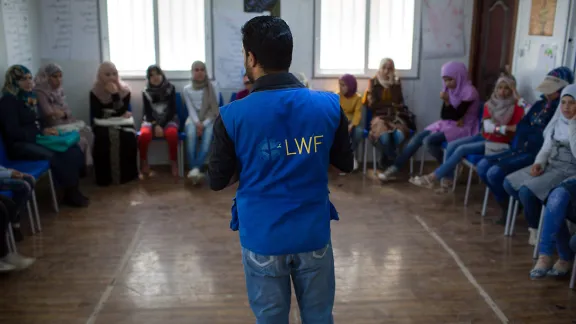
Syrian refugee Ahmad instills the value of education at the Za'atari camp. Photo: LWF Jordan
Syrians Ahmad and Haneen share talents in Za’atari
(LWI) - Tortured and forced to abandon university, Ahmad and Haneen are now overcoming adversity to support refugees at The Lutheran World Federation (LWF)-run camp in Za’atari, Jordan.
Ahmad and Haneen are Syrians, trying to leave their past behind as they volunteer at LWF projects in the camp.
Within the camp, LWF employs a number of Syrians to assist with projects. Not only does this provide workers with an income to support their families, but it offers an opportunity for them to engage in productive activities and contribute to the lives of fellow refugees.
From torture to tutor
In their position as volunteers it is often easy to forget that they too are facing the same challenges as the participants of the projects.
Ahmad is one of those volunteers. He was forced to leave Syria for his own safety after he was imprisoned and tortured, arriving in Jordan with his brothers and mother, whom they had to carry as they made their way on foot to the border because she had become ill on the journey.
Despite the difficult experiences, Ahmad has shown his enthusiasm and compassion for the children with whom he works. It is a struggle not to become depressed when he thinks about all he has lost and that there is no end in sight to the conflict.
Ahmad is now married and has a daughter, but says that had he known he would be unable to return to Syria in the near future, he would not have had a child. He doesn’t want her to grow up having only known life within a camp.
However, he dreams of one day being able to show his daughter the beauty of his homeland and to finish his degree in Arabic literature at university, which was interrupted because of the war.
One thing Ahmad has learnt from his experiences is how important education is and to value it while it is available. Hence his passion for helping other refugees in the camp excel at their studies through LWF’s psychosocial support projects.
Sharing her artistic talents
Haneen is another of LWF Jordan’s volunteers. When she and her family lived in Syria, they were in constant fear of the shelling and bombs falling around them. One day it could be their home reduced to rubble.
However, Haneen was studying art at university and when her parents decided to leave their home she resented them from taking her away from the things she loved.
After arriving at Za’atari camp and seeing the conditions in which she had to live, especially because at that time there was no running water and few latrines, Haneen fell into a depression, refusing to leave her family’s accommodation or even to allow her mother to open the curtains. Instead she slept all day.
This continued for six months until she gradually began to accept that her parents had done what they felt was best for her, to keep her safe and alive.
When LWF offered her the opportunity to be a volunteer, she was encouraged. It gave her hope. Now she shares her artistic talents with the children in the projects, teaching them to draw and paint. She says this is important for both herself and the children as it enables them find a way to express themselves and come to terms with some of the trauma they have experienced.
80,000 people and more arriving
The crisis in Syria has resulted in over 650,000 registered refugees in Jordan, with more continuing to arrive every day. Of these, almost 80,000 live in Za’atari refugee camp, a population size that would make it Jordan’s fourth largest city.
Set up in 2012 to provide temporary shelter for those arriving from Syria with what little they could carry, the camp has become a more permanent settlement. Za’atari now operates as something akin to a living city, with main roads such as the ironically nicknamed Champs Elysees, shops, schools, hospitals and bicycles to get around. However, the infrastructure and living conditions remain basic.
Caption: Syrian refugee Ahmad instills the value of education at the Za'atari camp. Photo: LWF Jordan


